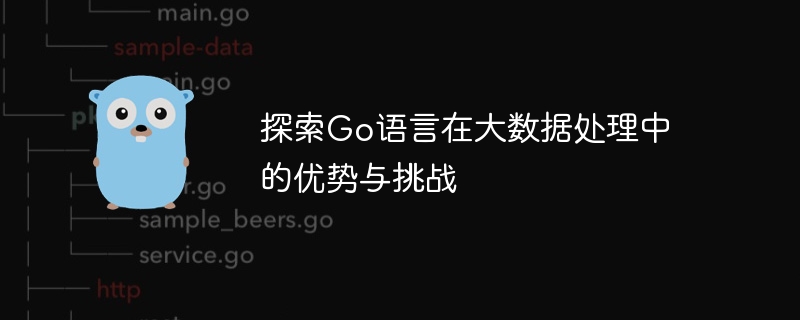

Explore the advantages and challenges of Go language in big data processing
With the development of the Internet and information technology, the amount of data has increased exponentially, and big data processing has It has become an important topic for many companies and organizations. In this context, it becomes crucial to choose an efficient and easy-to-use programming language to process big data. As a static, compiled language, Go language has gradually emerged in the field of big data processing. This article will explore the advantages and challenges of Go language in big data processing, and combine it with specific code examples to demonstrate its application.
Go language is famous for its concise and efficient concurrency model. Through Goroutines and Channels, the Go language implements lightweight concurrency processing and can better take advantage of multi-core processors. This concurrency model enables the Go language to perform tasks faster and improve system performance in big data processing.
The following is a simple sample code for concurrent processing:
package main
import (
"fmt"
"time"
)
func main() {
start := time.Now()
results := make(chan int)
for i := 0; i < 10; i++ {
go func(num int) {
time.Sleep(1 * time.Second) // 模拟耗时操作
results <- num * num
}(i)
}
for i := 0; i < 10; i++ {
fmt.Println(<-results)
}
elapsed := time.Since(start)
fmt.Printf("Time taken: %s
", elapsed)
}The compiler and runtime optimization of the Go language improve the performance of the code very well support. Its garbage collection mechanism, memory management and other aspects have been well optimized, making the performance of big data processing more stable.
The following is a simple performance test code example:
package main
import (
"fmt"
"time"
)
func main() {
start := time.Now()
var result int
for i := 0; i < 1000000000; i++ {
result += i
}
fmt.Println(result)
elapsed := time.Since(start)
fmt.Printf("Time taken: %s
", elapsed)
}Compared with some other Among popular big data processing languages, such as Java and Python, Go language has a relatively weak ecosystem in the field of big data. Although the standard library of the Go language already provides many commonly used data processing tools, libraries and tool support in some specific fields still need continuous improvement and development.
Currently in the field of big data, some mainstream data processing frameworks such as Hadoop and Spark are mainly written based on Java. Although the Go language also has some related data processing frameworks, there is still a certain gap in the maturity and stability of the Java ecosystem, so there may be challenges in some complex big data processing tasks.
In general, Go language, as an elegant and efficient programming language, has great potential in big data processing. Through its concurrency model and performance optimization, the performance of modern computer hardware can be better utilized, and the simplicity and ease of use of the Go language also bring convenience to big data processing. Although the Go language still has some challenges in terms of ecosystem and data processing framework, with its continuous development and improvement in the field of big data, I believe it will play an increasingly important role in future big data processing.
The above is the detailed content of Explore the advantages and challenges of Go language in big data processing. For more information, please follow other related articles on the PHP Chinese website!
 Usage of Type keyword in Go
Usage of Type keyword in Go
 How to implement linked list in go
How to implement linked list in go
 What are the Go language programming software?
What are the Go language programming software?
 How to learn go language from 0 basics
How to learn go language from 0 basics
 What are the methods to implement operator overloading in Go language?
What are the methods to implement operator overloading in Go language?
 What are the operators in Go language?
What are the operators in Go language?
 How many types of usb interfaces are there?
How many types of usb interfaces are there?
 What are the network file server tools?
What are the network file server tools?




